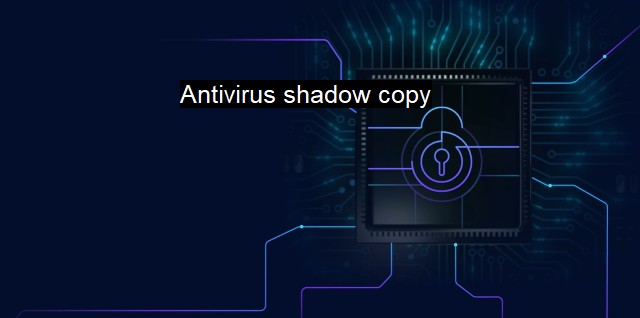What is Antivirus shadow copy?
Defending against Cyber Threats with Antivirus Shadow Copy: An Essential Tool for Effective Malware Prevention and Protection
The concept of "antivirus shadow copy" often refers to the mechanism utilized by antivirus solutions to keep a replica of files, documents, or data that might be at risk due to cyber threats. Its use primarily lies in the context of cybersecurity and antivirus technology.Antivirus software is created to secure your computer and files against virus and malware attacks, both known and innovative ones. Traditional antivirus technology would track or monitor changes in files and flag suspicious behavior. Still, as cyber threats advance and evolve continually, this old approach might not always be feasible. Once a virus or any harmful software corrupts a file, merely deleting it could result in significant data loss. This is where the idea of the ‘shadow copy’ comes into place.
a shadow copy is a duplicate or backup of a file or set of files. antivirus shadowing implies that the antivirus system creates a backup or ‘shadow copy’ of every file in its protected network. This means that when a file is attacked or corrupted by a virus, the original data remains safe because the antivirus system already created a duplicate copy of it. In case of a malware attack that begins to delete or encrypt files, the user or system administrator generally have recourse in the form of these shadow copies.
Within the cyber world, there exist cunning virus attacks named Ransomware that encodes the victim's data, making it undeletable. In such a predicament, the antivirus software uses 'shadow copy' to restore the encoded data, providing the victim with a smooth rescue operation. Ransomware usually targets the backed-up files first before moving on to the live data. successful antivirus software will either hide or better protect these shadow images to make them ransomware resistant.
Shadow copying is extremely convenient due to its low storage needs and efficient data recovery prospects. A full backup of an entire system's data is unnecessary since it tracks and registers only the changes made to the file. This results in less storage space being consumed, making the system more efficient.
While proving advantageous in the fight against cyber threats, the concept of 'antivirus shadow copy' is not without its challenges. Cyber attackers know their way around the shadow copy and may attempt to delete it first to make recovery impossible. Some modern ransomware has mastered this strategy, deleting the volume shadow copies before performing its digressions.
While this can potentially render the value of shadow copies moot, their usefulness should not be discounted outright. Instead, responsibility is placed on the cybersecurity developers to constantly evolve their software to guard against these advancements. Applying additional security measures and layers of protection can help ward off attacks that aim to eliminate shadow copies.
Specialized recovery software can be used to cross this hurdle. This software goes through the arduously slow procedure of filling in the sections of the snapshot that happen to be removed, a time-consuming process, but it usually results in the retrieval of the otherwise lost data.
'antivirus shadow copy' is a concept that utilizes backup technology to restore compromised files resulting from a cyber attack. With spam emails, phishing schemes, adware, ransomware, and all sorts of malware flooding the cyber world every second, computer security needs to evolve continuously. By using techniques like shadow copying, personal data can be held safe against cyber risk and the momentous damages it can bring. The vigilant defence measure that 'antivirus shadow copy' brings to the table reinforces the firewall's reliability in the relentless battle for cybersecurity.

Antivirus shadow copy FAQs
What is antivirus shadow copy and how does it work?
Antivirus Shadow Copy is a feature in some antivirus software that creates a backup copy of important system files before they are modified or deleted. If a virus or malware attempts to modify these files, the antivirus can compare them to the backup copy and restore them to their original state. This helps prevent the virus from causing permanent damage to the system.Is antivirus shadow copy a reliable cybersecurity feature?
Antivirus Shadow Copy is just one of many features that can enhance a system's cybersecurity. While it can be a helpful tool in preventing malware damage, it should not be relied on solely. It is important to use an antivirus program with multiple layers of protection and keep it up to date.Do all antivirus programs have the shadow copy feature?
No, not all antivirus programs have the Shadow Copy feature. It is often found in more advanced antivirus programs that have a broader range of features. Check with the manufacturer of your antivirus software to see if Shadow Copy is included.Can antivirus shadow copy protect against ransomware attacks?
Antivirus Shadow Copy can help protect against some types of ransomware attacks by creating a backup of important system files. However, it is important to note that ransomware attacks can also encrypt files and demand payment for their release. In these cases, antivirus shadow copy may not be enough, and it is important to have a strong backup and disaster recovery plan in place.| | A | | | B | | | C | | | D | | | E | | | F | | | G | | | H | | | I | | | J | | | K | | | L | | | M | |
| | N | | | O | | | P | | | Q | | | R | | | S | | | T | | | U | | | V | | | W | | | X | | | Y | | | Z | |
| | 1 | | | 2 | | | 3 | | | 4 | | | 7 | | | 8 | | |||||||